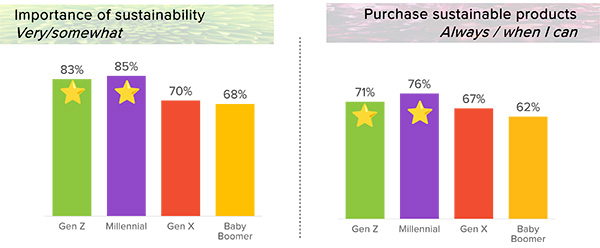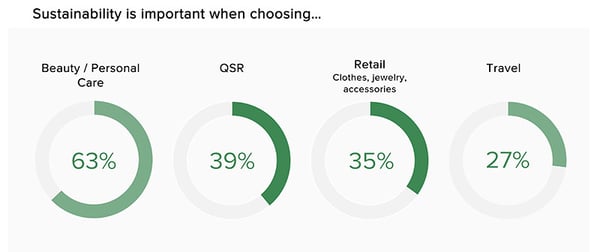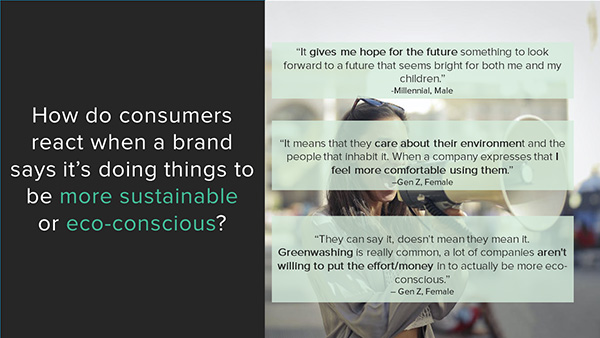Across categories like beauty, QSR, retail, and travel, sustainability is emerging in importance when making purchase decisions.
Even more than usual, sustainability has been on the mind this month. With Earth Day coming up quickly, sustainability has been front and center for consumers…and for brands!
For example, Coach recently introduced Coachtopia, a line of luxury products made primarily from waste leather. Royal Caribbean Group released a report outlining sustainability strategies and goals across its brands. And even Pokemon GO is getting in on Sustainability Week.
 To help Reach3 clients navigate shifts in sustainability, we wanted to explore this topic ahead of Earth Day. We leveraged Rival Technologies to conduct a timely, in-depth examination of US shoppers’ thoughts, sentiments, expectations, and interests when it comes to sustainability overall and in specific categories: beauty / personal care, travel, quick-service dining, and retail (clothes, jewelry, accessories).
To help Reach3 clients navigate shifts in sustainability, we wanted to explore this topic ahead of Earth Day. We leveraged Rival Technologies to conduct a timely, in-depth examination of US shoppers’ thoughts, sentiments, expectations, and interests when it comes to sustainability overall and in specific categories: beauty / personal care, travel, quick-service dining, and retail (clothes, jewelry, accessories).
We engaged with 1,261 US consumers, aged 16+ via our modern conversational, mobile-first chat approach to maximize both the representativeness and richness of insights.
Some surprising insights emerged from this research study. Below, we share our top 3 key findings on the future of sustainability. Feel free to reach out to our team for more info!
Sustainability is more important to Gen Zs and Millennials
Do consumers care about sustainability?
Short answer – yes. Consumers, especially younger consumers, care about sustainability.…and they want to shop sustainably. The majority of consumers (79%) say sustainability is important when making purchases and 70% say they purchase sustainable products. Though sustainability is important across age cohorts, Gen Z and Millennials lead the way when it comes to stated importance and sustainable shopping.

But what does sustainability mean? Top of mind, consumers think of eco-related attributes (e.g. recyclable, reusable, environmentally-friendly), but there are also strong associations with quality, health, and high price.
Prioritization of sustainability differs by industries
Where does sustainability fall in consumers' hierarchy of needs?
While there are generally other, or higher priority considerations when making shopper decisions, across different categories like beauty, QSR, retail and travel, sustainability is emerging in importance when making purchase decisions. Sustainability is an especially important consideration when shopping for beauty and personal care, speaking to especially strong appetite for sustainable products in this category.

So what are consumers actually interested in engaging with or buying? That’s a big question.
Across sectors, ingredients, packaging, and sustainable strategies communicate sustainability and would motivate consumers to engage or purchase. Reach out to our team for the full report and to get more details.
Consumers are becoming more skeptical of greenwashing
Sustainable brands and brands that are doing eco-friendly things are interesting and stand out to consumers. However, there are larger socio-economic factors and attitudes brands need to keep in mind as they embark on sustainability initiatives. Cost of living continues to impact Americans’ shopping behaviors, including selection of sustainable products, which can often be pricier than regular (not necessarily sustainable) options.
And while consumers like it when brands are sustainable or eco-friendly, there are a lot of brands making a lot claims. On a certain level, consumers have become skeptical. It’s not enough for brands to say they’re helping the environment; they need to prove it.

Sustainability is important, and it’s not just a fad...
Consumers’ attitudes, behaviors, and needs around sustainability are fluid, and can shift with changing times and larger socio-economic conditions.
Brands will need to keep pace with consumers’ shifting attitudes to best meet their expectations and deliver on their sustainability needs.
Get in touch to find out how Reach3’s conversational, in-the-moment, and Community 2.0 approaches can get you closer to your customers’ authentic and ever-evolving attitudes toward sustainability.

Christine Nguyen, PhD
Research Director







.webp?width=65&height=83&name=A-LIGN_HIPAA%20(1).webp)

